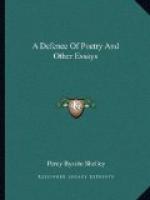The parts of a composition may be poetical, without the composition as a whole being a poem. A single sentence may be a considered as a whole, though it may be found in the midst of a series of unassimilated portions: a single word even may be a spark of inextinguishable thought. And thus all the great historians, Herodotus, Plutarch, Livy, were poets; and although, the plan of these writers, especially that of Livy, restrained them; from developing this faculty in its highest degree, they made copious and ample amends for their subjection, by filling all the interstices of their subjects with living images.
Having determined what is poetry, and who are poets, let us proceed to estimate its effects upon society.
Poetry is ever accompanied with pleasure: all spirits on which it falls open themselves to receive the wisdom which is mingled with its delight. In the infancy of the world, neither poets themselves nor their auditors are fully aware of the excellence of poetry: for it acts in a divine and unapprehended manner, beyond and above consciousness; and it is reserved for future generations to contemplate and measure the mighty cause and effect in all the strength and splendour of their union. Even in modern times, no living poet ever arrived at the fullness of his fame; the jury which sits in judgement upon a poet, belonging as he does to all time, must be composed of his peers: it must be impanelled by Time from the selectest of the wise of many generations. A poet is a nightingale, who sits in darkness and sings to cheer its own solitude with sweet sounds; his auditors are as men entranced by the melody of an unseen musician, who feel that they are moved and softened, yet know not whence or why. The poems of Homer and his contemporaries were the delight of infant Greece; they were the elements of that social system which is the column upon which all succeeding civilization has reposed. Homer embodied the ideal perfection of his age in human character; nor can we doubt that those who read his verses were awakened to an ambition of becoming like to Achilles, Hector, and Ulysses the truth and beauty of friendship, patriotism, and persevering devotion to an object, were unveiled to the depths in these immortal creations: the sentiments of the auditors must have been refined




